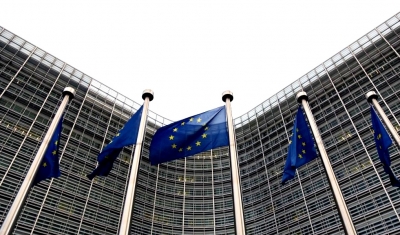EU positions India as strategic ally in building resilient, rules-based connectivity: Report
By IANS | Updated: August 1, 2025 16:19 IST2025-08-01T16:10:46+5:302025-08-01T16:19:50+5:30
New Delhi, August 1 Despite many fundamental differences on normative principles, India sees the European Union (EU) as ...

EU positions India as strategic ally in building resilient, rules-based connectivity: Report
New Delhi, August 1 Despite many fundamental differences on normative principles, India sees the European Union (EU) as a like-minded partner in countering infrastructure and technology strategies that threaten its sovereign and security interests, particularly the China-Pakistan Economic Corridor (CPEC) and the Belt and Road Initiative (BRI), a report has detailed.
Arguments for Global Gateway Strategy (GGS) to become a defining factor of India–EU ties have shaped engagements with the normative idea of the strategy, a report published by the Singapore-based Lee Kuan Yew School of Public Policy stated.
Both the GGS and the EU–India Connectivity Partnership were launched in 2021, marking the start of an institutionalised approach to connectivity and laying the foundation of strategic alignment.
The EU frames its GGS as a rules-based initiative to boost connectivity across the world, committing around EUR 300 billion through 2027 to develop “smart, clean, and secure” infrastructure that aligns with EU standards. EU has showcased the GGS as a model for “equal partnerships” in infrastructure and digital development, stressing strong environmental and social safeguards, democratic governance and transparency. This framework positions India as a like-minded partner while China is considered a strategic rival — albeit one with indispensable economic significance, as per the report.
In February 2023, India and EU launched the Trade and Technology Council (TTC) — only the second such EU forum, the first being with the US to cooperate on digital, energy, and supply-chain issues. This further bolsters the ties between India and the GGS on digital public infrastructure projects and will allow New Delhi to pair its digital platforms like unified payments and open-data networks, with EU funding for projects in Africa and Asia. In addition, this aligns with India’s efforts to position itself as a partner to developing economies.
Amidst rising trade rifts between EU and China, the progress of the negotiations between India and the EU on Free Trade Agreement (FTA) and plans of two sides to use the India-Middle East-Europe Economic Corridor (IMEEC) as a testbed for connectivity is considered in Delhi as evidence of Brussels' intention to elevate EU-India strategic partnership, as per the Lee Kuan Yew School of Public Policy report.
The EU-India statements underscore India's role as a key partner in the Indo-Pacific. EU President Ursula von der Leyen has called India a "leading voice of the Global South" and a "bridge" between the Global South and the EU. Earlier in June, External Affairs Minister (EAM) S Jaishankar and European Commissioner for International Partnerships, Jozef Síkela reiterated their commitment under GGS, emphasising “investing together in sustainable development projects that create jobs, connect communities, and strengthen our global resilience.”
Although, EU and China commemorated 50th anniversary by EU–China Summit in Beijing. Diplomatic lines between two sides remain open, however, structural mistrust over trade and security casts a long shadow, making any substantial breakthroughs elusive in the near term. The EU is following a policy of “de‑risking, not decoupling”, aiming to protect critical supply chains and diversify dependencies while continuing to engage on climate, energy, tech, and regulatory dialogues.
Since its launch in 2021, the GGS is often considered a values-based, high-standard alternative to China’s Belt and Road Initiative (BRI). GGS has committed to uphold open procurement and high environmental and social criteria —features that differentiates it from the BRI, whose contracts often back China’s state-owned enterprises and financial institutions. The initiative seems to be launched to address critiques commonly related to BRI. While EU regards GGS as a vehicle to “tackle pressing global challenges” and promote EU norms. However, leaked EU strategy document terms GGS as a tool in a geopolitical “battle of offers” with China, as per the report.
The EU has positioned India as a strategic ally in building resilient, rules-based connectivity, while China is regarded a competitor whose model GGS is meant to counter. Under the EU's strategic discourse, China is largely considered a systemic rival and terms such as “strategic autonomy” and “de-risking” frequently mention in Brussels’ narratives to Beijing, demonstrating caution and concern. While EU considers India as a partner and an emerging leader of the Global South.
Disclaimer: This post has been auto-published from an agency feed without any modifications to the text and has not been reviewed by an editor
Open in app